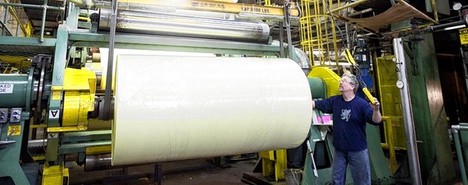 “Carbonless paper comes off a coating machine at Appleton Papers in March. Mexican tariffs have hit sales.” Source of caption and photo: online version of the WSJ article quoted and cited below.
“Carbonless paper comes off a coating machine at Appleton Papers in March. Mexican tariffs have hit sales.” Source of caption and photo: online version of the WSJ article quoted and cited below.
(p. A5) APPLETON, Wis.–Congress’s vote last year to keep Mexican truck drivers south of the border was good news for DuWayne Marshall.
Mr. Marshall, 49 years old, owns a truck and hauls loads all over the U.S. from his home in Wisconsin. “Why should I have to compete against Third World drivers within my own borders?” Mr. Marshall asked during a break on a run to San Diego. “By closing down the borders, we are saving American jobs.”
Elizabeth Villagomez, 38, isn’t so sure. A single mother of two teens, she has worked at a paper plant in this community near Green Bay for 15 years. After the Mexican government retaliated against the trucking ban by slapping $2 billion in tariffs on U.S. paper, produce and other goods, orders plunged and managers began slashing shifts and overtime for the unionized work force.
“The company has done all it can to cut costs,” Ms. Villagomez said. “I’m at the bottom of the list if they have layoffs. It’s kind of scary, not knowing if you’re going to have a job.”
. . .
At Appleton Papers Inc., the fight over who can drive a truck across a border 1,600 miles away has translated into falling wages and rising anxiety.
Rick Bahr, head of the United Steelworkers union local that represents more than 500 employees at the Appleton plant, said six shifts have already been cut, cutting down on overtime.
“The battle ends up union versus union, truckers versus the paper workers,” Mr. Bahr said. The national steelworkers’ union has been supporting the Teamsters on the issue of Mexican trucks in the U.S.
Nearly half the company’s revenue, about $420 million last year, comes from carbonless paper sales. Its largest foreign customer is Mexico. After Mexico put a 10% tariff on carbonless paper, revenue from Mexico fell to $37 million in 2009 from $46 million in 2008.
Now, more Mexican customers say they will look for alternative suppliers to avoid having to bear part of the tariff costs. Just last month a major customer told Appleton it was going to get its carbonless paper from a European producer.
Even before the tariffs were imposed, the company had seen business hit by the economic slowdown and had cut its work force in 2008 and stopped other benefits, such as reimbursing tuition and matching workers’ contributions to their 401K retirement plans. Company officials said it was hard to quantify what part of the business downturn could be blamed directly on the tariffs, but they noted that Appleton sold 18% fewer tons of carbonless paper in the U.S. last year, compared with 2008. The number of tons sold to Mexican customers was down 24%.
Inside the plant, the machine that coats 4,000-pound rolls of paper to make it carbonless was idle one recent afternoon. Once run 24 hours a day, it is now used only half that time.
Kevin Bunnow, 50, a 33-year veteran of the plant, said the reduction in shifts had meant a wage cut of several thousand dollars last year.
“When elephants fight, the grass loses,” he said. “It didn’t take me long to realize, we’re the grass.”
For the full story, see:
GARY FIELDS. “Trade Dispute Divides Workers; It’s ‘Union vs. Union’ as Ban on Mexican Trucks Cheers Drivers, Triggers Cut in Hours at Paper Plant.” The Wall Street Journal (Tues., April 6, 2010): A5.
(Note: ellipsis added.)
